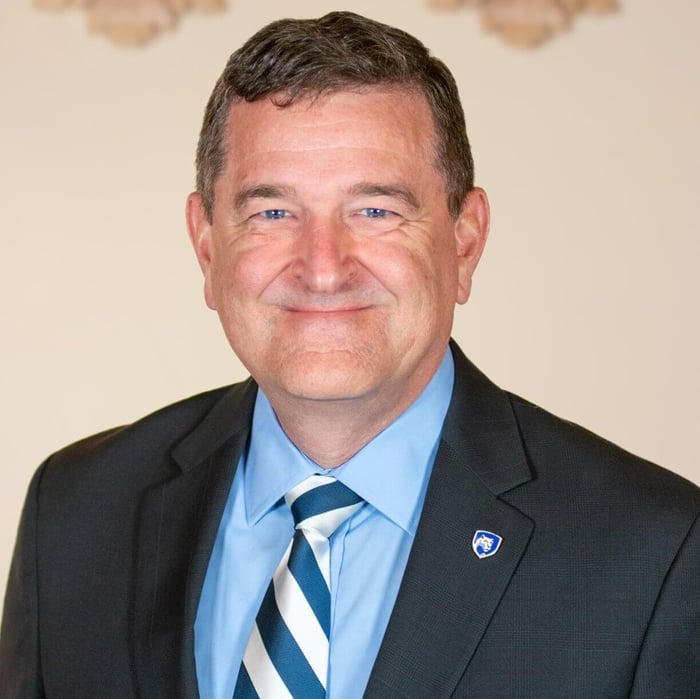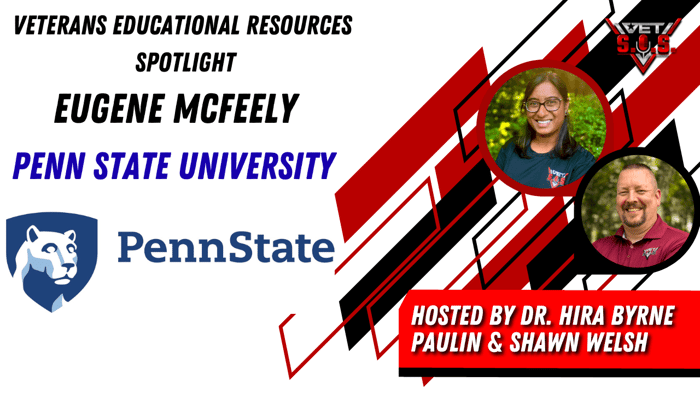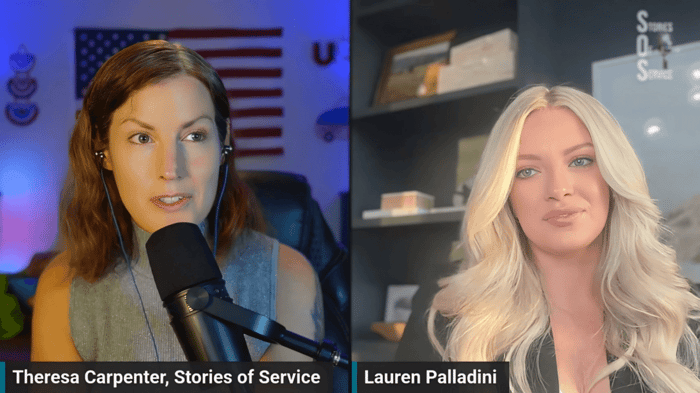Veteran Support at Penn State: Building a Stronger Future for Military-Connected Students
Veteran support at Penn State is more than a department—it’s a commitment that permeates every aspect of the university’s mission. In a recent episode of the VET S.O.S. Veteran Educational Resources Spotlight, host Shawn Welsh connected with Eugene McFeely, Senior Director of Veteran Affairs and Services at Penn State University. Their conversation sheds light on the robust programs and deeply rooted culture that make Penn State one of the most veteran-supportive institutions in the country.
McFeely, a 1989 Penn State alumnus and retired U.S. Air Force officer, returned to his alma mater in 2017 to lead veteran affairs. With 27 years of military service and a strong understanding of both the academic and military worlds, he brings a mission-driven approach to higher education that has transformed how veteran support at Penn State is delivered.
From Air Force to Academia: McFeely’s Path Back to Penn State
 Eugene McFeely
Eugene McFeelyEugene McFeely’s journey is itself a success story of transition. After retiring as an F-15E aircrew member and ROTC leader, he seamlessly moved into his role at Penn State. His own transition helped shape the programming he now leads. Having already served two years at Penn State ROTC prior to retiring, he experienced firsthand the contrast between military and civilian institutions, and how to bridge that gap effectively.
This unique experience has given McFeely the insight needed to improve and evolve veteran support at Penn State for thousands of students.
A Wide Reach with Local Impact
Penn State is one of the largest universities in the country, with 24 physical campuses and the expansive Penn State World Campus. Across these platforms, the university serves close to 90,000 students, of which more than 4,000 are military-connected.
Penn State World Campus plays a particularly crucial role in veteran education. Around 20% of World Campus students are affiliated with the military, underscoring the university’s commitment to flexible, high-quality, and accessible education. Veteran support at Penn State extends to both in-person and remote learners with the same passion and effectiveness.
Creating Veteran-Centered Spaces
One standout component of veteran support at Penn State is the network of physical spaces dedicated to military-connected students. Approximately 70% of Penn State campuses have a student veteran center, and the University Park campus features a 6,300-square-foot facility specifically designed for community building, peer engagement, academic support, and mental health services.
These veteran spaces serve as safe havens where students can connect with peers who share their military background. In a university the size of Penn State, these hubs are critical for reducing isolation and fostering meaningful support networks.
Transition Support That Starts Before Day One
Recognizing the significant culture shift that occurs when moving from the military to the classroom, veteran support at Penn State begins before students even attend their first class. McFeely outlined several programs that ease this transition:
Veteran College Boot Camp: This pre-semester initiative includes over a month of online learning and a week of on-campus programming. It helps veterans refresh their academic skills and adjust to college life before thousands of other students arrive.
Peer Mentorship Program: New students are paired with experienced student veterans who offer practical guidance and moral support—mirroring the military tradition of sponsor programs during PCS moves.
Veterans First-Year Seminar: During the semester, this class helps student veterans establish their community, develop academic skills, and navigate university systems.
Together, these programs represent the front line of veteran support at Penn State, helping students enter their academic journeys with confidence and clarity.
A Culture of Compassion, Innovation, and Inclusion
A remarkable and endearing element of veteran support at Penn State is the presence of Podrick, a certified facility dog who works full-time at the Student Veteran Center. More than just a mascot, Podrick plays an essential role in lowering stress during counseling sessions and offering emotional support. He’s even been humorously dubbed “Employee of the Month” for an entire year.
Penn State also emphasizes inclusion through its Military Cultural Competency Course (commonly known as Green Zone training), which McFeely himself teaches. This training helps faculty and staff understand the lived experiences of student veterans, promoting more meaningful interactions and reducing stigma. Graduates of this program can join the Veteran Ally Program, creating a university-wide network of informed supporters ready to assist military-connected students.
Academic Flexibility and Protections
Penn State understands that military life doesn’t stop for coursework. That’s why veteran support at Penn State includes formal policies for students called to duty. A short-notice deployment policy ensures that students are not penalized academically or financially if they must leave suddenly due to orders. This flexibility is critical, especially for World Campus students who may be deployed or attending class from remote locations.
Faculty and staff are trained to support these students with compassion and logistical agility, often adjusting deadlines and coursework to accommodate real-world military commitments.
Beyond the Classroom: Career Readiness and Life After Graduation
A key focus of veteran support at Penn State is preparing students for life after college. McFeely insists that while earning a degree is important, it’s the next step—graduate school, a career, or entrepreneurship—that really defines success.
To that end, the university has recently hired a dedicated career services counselor specifically for the veteran community. This role is helping develop tailored programming, professional mentorship, and job placement support that reflects the unique skills and challenges of veterans transitioning into the workforce.
Whether a student wants to pursue a master's program, join a corporation, or start their own business, veteran support at Penn State is designed to guide them through that journey with purpose and personalized assistance.
Community, Connection, and Visibility
Penn State’s dedication to its military community doesn’t stop at services—it’s also about visibility and recognition. The university hosts an annual Military Appreciation Week that includes weeklong events, strategic storytelling, and even a football game celebration. These initiatives shine a spotlight on the veteran experience and help build bridges between the military and civilian student populations.
Strategic communications and storytelling are also a central part of how veteran support at Penn State remains transparent, impactful, and inspiring.
Why Choose Penn State?
When asked why a military-connected student should choose Penn State, McFeely emphasized three core values:
Support Networks – With dedicated spaces, peers, and staff who are veterans themselves, students will never feel alone in their journey.
Academic Excellence – With both in-person and online options, Penn State offers world-class degrees backed by a respected brand.
Deep Commitment to Veterans – Through policies, programming, and people, veteran support at Penn State is built to last—and built to care.
Final Thoughts
The conversation with Eugene McFeely painted a clear picture: Veteran support at Penn State is intentional, inclusive, and continually evolving to meet the needs of a diverse and growing population. From transition tools to career coaching and emotional wellness, the university offers a blueprint that other institutions would do well to follow.
Whether you’re a service member planning for your next chapter, a veteran searching for community and purpose, or a military spouse ready to return to school, Penn State is a place where your journey will be honored—and your future empowered.






